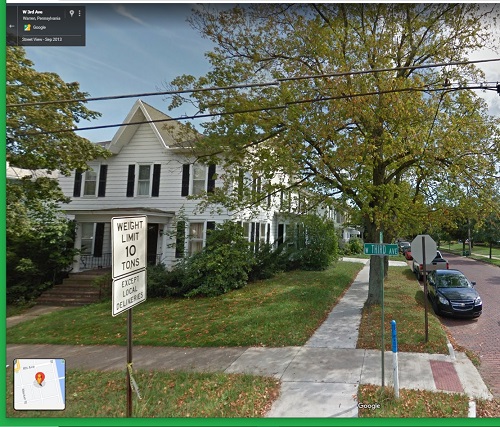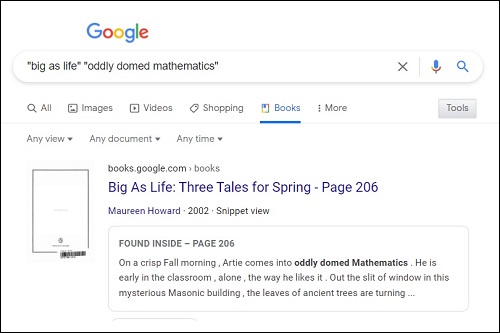"Weight limit 10 tons… Except local deliveries" —

Conclusion: the book is a mine of information, but
you sure have to dig for it. — Paul R. Halmos,
review of Topological Dynamics , November 1955
"Weight limit 10 tons… Except local deliveries" —

Conclusion: the book is a mine of information, but
you sure have to dig for it. — Paul R. Halmos,
review of Topological Dynamics , November 1955
|
"Poincaré said that science is no more a collection of facts than a house is a collection of bricks. The facts have to be ordered or structured, they have to fit a theory, a construct (often mathematical) in the human mind. … Mathematics may be art, but to the general public it is a black art, more akin to magic and mystery. This presents a constant challenge to the mathematical community: to explain how art fits into our subject and what we mean by beauty. In attempting to bridge this divide I have always found that architecture is the best of the arts to compare with mathematics. The analogy between the two subjects is not hard to describe and enables abstract ideas to be exemplified by bricks and mortar, in the spirit of the Poincaré quotation I used earlier."
— Sir Michael Atiyah, "The Art of Mathematics" |
|
Gottschalk Review —
W. H. Gottschalk and G. A. Hedlund, Topological Dynamics, The ending of the review — The most striking virtue of the book is its organization. The authors' effort to arrange the exposition in an efficient order, and to group the results together around a few central topics, was completely successful; they deserve to be congratulated on a spectacular piece of workmanship. The results are stated at the level of greatest available generality, and the proofs are short and neat; there is no unnecessary verbiage. The authors have, also, a real flair for the "right" generalization; their definitions of periodicity and almost periodicity, for instance, are very elegant and even shed some light on the classical concepts of the same name. The same is true of their definition of a syndetic set, which specializes, in case the group is the real line, to Bohr's concept of a relatively dense set. The chief fault of the book is its style. The presentation is in the brutal Landau manner, definition, theorem, proof, and remark following each other in relentless succession. The omission of unnecessary verbiage is carried to the extent that no motivation is given for the concepts and the theorems, and there is a paucity of illuminating examples. The striving for generality (which, for instance, has caused the authors to treat uniform spaces instead of metric spaces whenever possible) does not make for easy reading. The same is true of the striving for brevity; the shortest proof of a theorem is not always the most perspicuous one. There are too many definitions, especially in the first third of the book; the reader must at all times keep at his finger tips a disconcerting array of technical terminology. The learning of this terminology is made harder by the authors' frequent use of multiple statements, such as: "The term {asymptotic } {doubly asymptotic } means negatively {or} {and} positively asymptotic." Conclusion: the book is a mine of information, but you sure have to dig for it. — PAUL R. HALMOS |
On Doctor Strange in Spider-Man: No Way Home —
"This all-powerful wizard really used 'Scooby-Doo' as a verb
meaning 'successfully pull off a series of physical challenges
against monsters who are real.' What in the dad-trying-to-
relate-to-his-distant-son hell? That's like pumping someone up
to kick a game-winning field goal by saying 'Charlie Brown this crap.'"
— Vinnie Mancuso at Collider , November 17, 2021
But seriously . . .
From posts tagged Frankfurter —
"Scooby-Doo this ."
The above image suggests a review of Sigaud in this journal and of . . .
Related material from the Web —
"Anubis, easily recognizable as an anthropomorphized jackal or dog,
was the Egyptian god of the afterlife and mummification. He helped
judge souls after their death and guided lost souls into the afterlife.
So, was he evil? No, and in fact just the opposite. In ancient Egyptian
mythology the ultimate evil was chaos. Nearly all of Egyptian mythology
was focused around maintaining the cycles of cosmic order that kept
chaos at bay. Few things were as significant in this goal as the rituals
maintaining the cycle of life, death, and afterlife. Therefore, Anubis was
not evil but rather one of the most important gods who kept evil out of Egypt."
— Christopher Muscato at Study.com

"On a crisp Fall morning…." — The late Maureen Howard, writer of fiction.
Non-fiction: Feb. 19, 2022,
https://news.yahoo.com/frances-haugen-
on-meta-headquarters-122958675.html —
FRANCES HAUGEN: To give you a sense of how absurd the space is,
so Facebook is obsessed with 15 and 30-minute meetings. It's like they're
very efficient, everyone's– they're obsessed with the word crisp, like are
your documents crisp, is your explanation crisp? The space is so large that
I would regularly walk 15 minutes, 10, 15 minutes to go to a 30-minute meeting.
And again, fiction . . .
Powered by WordPress